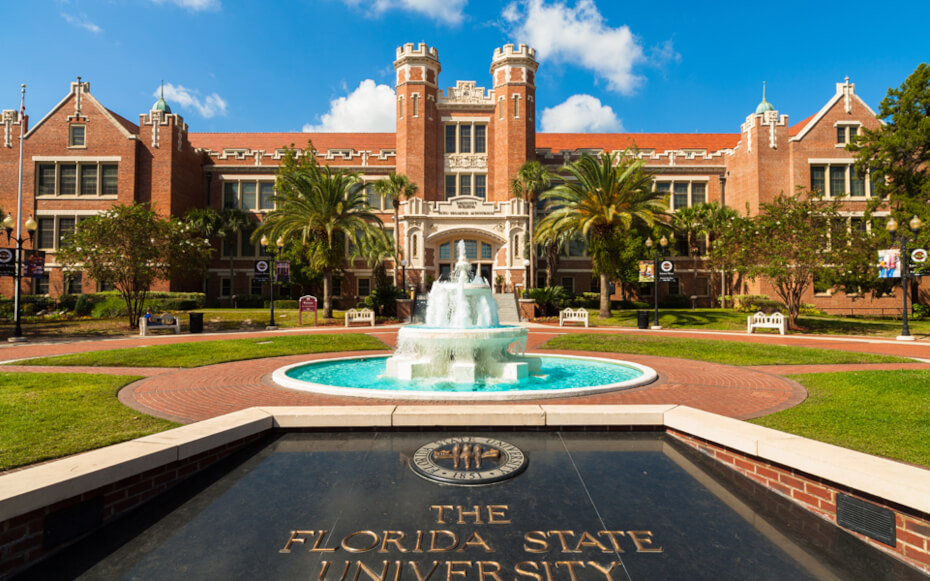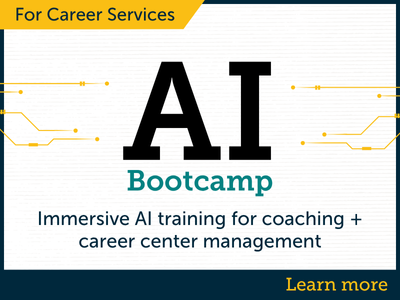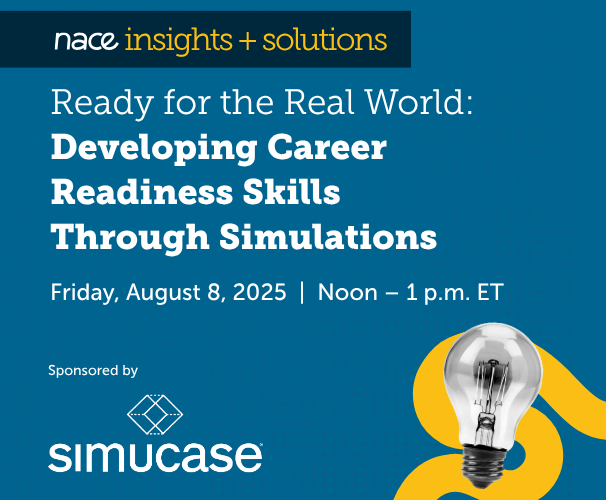NACE Journal, November 2020
Founded in 1851, Florida State University (FSU) holds the rank of the 18th best public university in the United States, is designated as a preeminent university within the State University System of Florida, and boasts the state’s best four-year graduation rate.1 FSU’s main campus is in Tallahassee, with additional campuses in Panama City, Florida, and Panama City, Republic of Panama. FSU’s approximately 33,000 undergraduate students are pursuing baccalaureate degrees through 102 programs offered by 16 academic colleges and schools. Among the most in-demand universities for prospective students, FSU received nearly 60,000 applications for 6,000 undergraduate program admission spots, resulting in a diverse student body with representation from all 50 states and 21 countries; 34.4% of students identify as ethnic minorities. Nearly one-third of FSU’s undergraduate students are Pell Grant recipients, and nearly one-third are first-generation college students.
The governor and Florida legislature called for a renewed focus on helping students prepare for and secure jobs post-graduation. In response, FSU championed student participation in experiential learning as a high-impact practice with an aim to create one of the most diverse and robust talent pipelines in the nation.
An Experiential Learning Graduation Requirement
To enrich the student learning experience, our campus adopted an experiential learning graduation requirement (ELR) for all undergraduate students. Upon implementation in summer 2019, FSU became the largest and most diverse university in the country to have such a requirement.
Prior to adopting the ELR, FSU focused on intentional creation of support services and programs that would facilitate students’ access to experiential learning, particularly leveraging the centralized FSU career center to bring it to fruition. FSU implemented a four-point approach to increase student engagement in experiential learning:
1. Leveraging partnerships between the centralized career center and academic units to build, oversee, and track experiential learning engagements;
2. Providing flexibility in credit-hour requirements, leveraging the career center’s non-credit course;
3. Offering financial assistance to support participation in off-campus experiential learning opportunities and creating meaningful on-campus experiences; and
4. Publicizing information about opportunities in ways that maximize student awareness.
Students satisfy the ELR through enrollment in approved experiential learning courses, allowing students to apply and strengthen their knowledge, skills, and abilities through hands-on experiences outside of the classroom with oversight, reflection facilitation, and evaluation by qualified faculty and staff. To ensure that every FSU undergraduate student will complete a “right fit” opportunity related to their major or career goal, approved experiential learning opportunities span internships, service learning, undergraduate research, creative activity, international study, and leadership experiences.
Minimizing Barriers to Experiences
FSU’s goal is that every FSU undergraduate, regardless of family income or background, must have the access and opportunity to participate in transformative, career-building experiences before graduation. Often, students with greater financial means are in a better position to take unpaid internships and travel abroad. While underserved students face cultural, financial, and other obstacles that can hinder participation, research shows these students actually benefit the most from participating in these types of experiences.2
With buy-in and support from academic affairs and partnerships across student affairs, the centralized career center successfully implemented a variety of short- and long-term experiential learning curricular and co-curricular programs complemented by wraparound support services aimed at increasing student access to and engagement in career-goal-related experiential learning opportunities (ELOs).
These initiatives include hiring seven new career liaisons for colleges with majors that did not traditionally embed experiential learning into program requirements, leveraging our zero-credit-hour virtual experiential learning course, launching a one-day matched job shadowing program, establishing a paid on-campus internship program, creating an internship scholarship fund, revitalizing an alumni mentorship program, partnering with micro-internship and virtual internship providers, and creating an institutional internship task force. These strategies, programs, and initiatives were key in solidifying the career center’s subject matter expertise in experiential learning initiatives and securing ongoing contributory roles in the planning, creation, and roll out of the ELR.
Students can elect to satisfy the university’s ELR at any point during matriculation by completing an approved academic course. The only non-credit, no-cost option for students to satisfy the ELR, while gaining either transcript notation or a certificate of completion, is the Experience Recognition Program (ERP), managed by the career center. ERP provides structure for students engaged in ELOs, with students receiving weekly tips, videos, and short articles relevant to their chosen experience, while their supervisor receives best practices for supervision. Because students participate in a variety of experiential learning opportunities through ERP, the program is divided into five sections: internship, leadership, research, international, and creative/entrepreneurial experiences. Over the past year alone, student program participation increased 85%, and that growth has been distributed across academic majors and programs.
On-Campus Experiential Learning
The career center, in partnership with the Office of the Provost, launched the InternFSU Program in fall 2017. The program offers 100 on-campus paid positions for currently enrolled full-time undergraduate FSU students during the fall and spring semesters.
Regardless of financial resources, students can seek jobs and internships that relate to their desired careers. Since the inaugural semester of the program in spring 2018 to spring 2020, we have received 8,370 applications. Students accepted into the program are guaranteed 120 hours at $10 per hour during the semester. The funding model offers 50% wages from the career center funded by the provost office and 50% from the internship site.
After successfully completing the program, InternFSU student participants receive a transcript notation for their experience, satisfying the ELR. Through our surveys, all 525 participants, or 100%, indicated that they will recommend this program to others.
Experiential Learning Funding
A NACE research report indicated that 43% of internships in 2017 were unpaid.3 This figure does not account for students who were unable to afford to take unpaid or underpaid internships.
To help close this gap, in the fall 2017, the career center’s Internship Fund was created to provide financial support to our students who may otherwise decline an internship due to financial barriers (costs associated with travel, lost part-time job wages, housing, professional wardrobe, and so forth).
Since its inception, the fund has received more than 300 applications requesting more than $500,000 in support. To date, 101 students have received funding for a total of $51,850 in awards of $1,000, $500, or $250. With an initial funding seed from our operational budget, each year we solicit donors, apply for grants, and work with our division’s development office to grow and endow the fund. Additionally, we continually recruit new partners for FSU that want to facilitate student engagement in experiential learning with financial support, such as our Enterprise Diverse Student Population Scholarship, which awards $1,000 to support student success, including gaining hands-on experiences.
Virtual Experiential Learning Opportunities
During the pandemic, FSU became a model for fostering best practices in distance/remote experiential education. FSU has always supported student engagement in remote ELOs to avoid having geography and funding for travel as barriers to student engagement; therefore, FSU already had processes in place for vetting and evaluating virtual experiences. During the summer and fall 2020 semesters, career center staff served on a task force to develop university recommendations for academic credit for virtual versus in-person experiential learning. In addition, the career center’s Internship Council was leveraged to ensure faculty and staff teaching for-credit experiential learning courses understood university practices related to student liability waivers and documentation for site supervisors. Career center staff also shared best practices in virtual ELO student engagement through webinars for the Southern Association of Colleges and Employers and the Cooperative Education and Internship Association.
Information about our model for connecting students to and supervising structure during virtual internships is available to all through our Career Community webpage and Making Your Internship Count workbook, which provides structure for both the student participant and the professional site supervisor.
*****
FSU is aiming to level the playing field and make it possible for every student, no matter their background, to have access to transformative career readiness experiences through experiential learning. As a direct result of these contributions to campus operations, the Princeton Review ranked the FSU career center as one of the top 20 best university career services offices, and, for seven consecutive years, graduating seniors have named the career center as the No. 1 way they found employment.
Endnotes
1 Farnum-Patronis, A. (September 9, 2019). “Florida State University joins nation’s top 20,” Florida State University News. Retrieved from news.fsu.edu/news/university-news/2019/09/09/florida-state-university-joins-nations-top-20/ .
2 Finley, A., & McNair, T. (2013). Assessing underserved students' engagement in high-Impact practices. American Association of Colleges and Universities. www.aacu.org/assessinghips/report .
3 National Association of Colleges and Employers (October 2017). Class of 2017 Student Survey Report.







